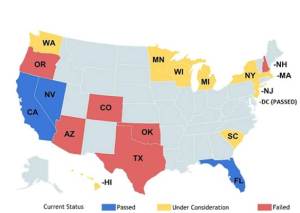In a previous blog entry, we discussed why we think Virginia should be one of the hubs for Driverless Technology, and talked about working to get a law passed in Virginia about this. We’ve been working this.
Since then, we’ve met with Jim Duffey, Virginia’s Secretary of Technology at the Virginia Center for Innovative Technology. However, Secretary Duffey is on his way out as we have a new governor from a different party recently elected (but not yet sworn in) so we didn’t make much progress. We’ll try to meet with his successor (once he has been identified) as soon as we can. We’re also going to start meeting with our state delegates and senators.
We’re working now to continue our research both to gain a better understanding of where things stand today, and to come up with logical ways of moving forward.
As you can see in the image below from Stanford’s Center for Internet and Society, three states, California, Nevada and Florida, plus the District of Columbia have passed laws around Driverless Technology.

We also talked to Bryant Walker Smith, a fellow at the Center for Internet and Society at Stanford Law School and the Center for Automotive Research at Stanford. Mr. Walker Smith is one of the leading (if not the leading) experts on the legal issues regarding driverless technology. Mr. Walker Smith stated that there isn’t anything preventing the operation of driverless cars in any state. When the laws were written no one contemplated a car that would drive itself. (Click here for Mr. Walker Smith’s paper on this.)
The California law actually state that California law “presently does not prohibit or specifically regulate the operation of autonomous vehicles.”. It also requires additional rule making by the end of 2014. The Nevada law “directs state DMV to adopt rules for license endorsement and for operation, including insurance, safety standards, and testing[1].
A big risk if each state puts together its own guidelines is that we get a complex mix of rules that hinder the development and launch of the technology. This is a real risk. The NHTSA (National High Transportation and Safety Administration) is urging states to be careful and in their Preliminary Statement of Policy Concerning Automated Vehicles:
In general, we believe that states are well suited to address issues such as licensing, driver training, and conditions for operation related to specific types of vehicles. NHTSA has considerable concerns, however, about detailed state regulation on safety of self-driving vehicles for purposes other than testing.
The NHTSA goes on to recommend that state level legislation contains the following provisions:
- Ensure that the Driver Understands How to Operate a Self-Driving Vehicle Safely
- Ensure that On-road Testing of Self-driving Vehicles Minimizes Risks to Other Road Users
- Limit Testing Operations to Roadway, Traffic and Environmental Conditions Suitable for the Capabilities of the Tested Self-Driving Vehicles
- Establish Reporting Requirements to Monitor the Performance of Self-Driving Technology during Testing
- Ensure that the Process for Transitioning from Self-Driving Mode to Driver Control is Safe, Simple and Timely
- Self-Driving Test Vehicles Should Have the Capability of Detecting, Recording, and Informing the Driver that the System of Automated Technologies has Malfunctioned
- Ensure that Installation and Operation of any Self-Driving Vehicle Technologies does not Disable any Federally Required Safety Features or Systems
- Ensure that Self-Driving Test Vehicles Record Information about Status of Automated Control Technologies in the Event of a Crash or Loss of Vehicle Control
As we stated in out last blog, we think that Virginia makes an ideal location for another hub around driverless technology. While technically, there is no requirement to put a new law in place in order to allow testing of these vehicles, we believe it makes sense for the legislature to put some guidelines around it and that those outlined by the NHTSA are a very good starting point. Consequently, we are going to continue to pursue this and to recommend this type of bill.
[1] The Stanford Center for Internet and Society
